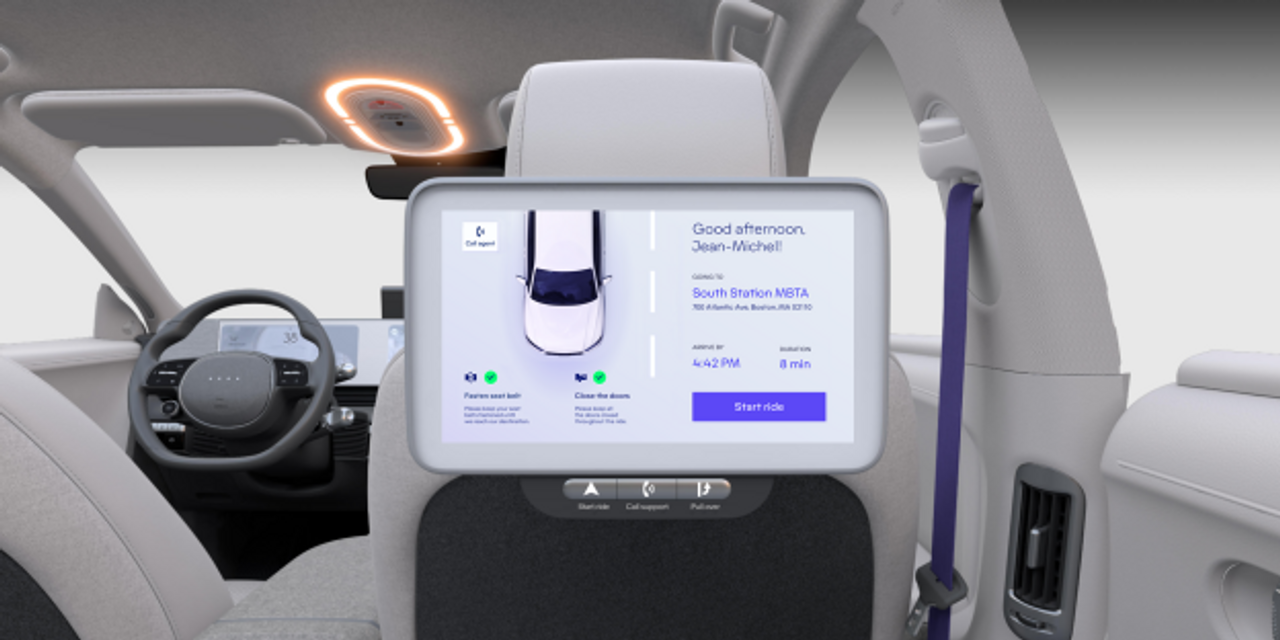

Driverless technology company Motional AD Inc.’s vision for how passengers will ride in its planned self-driving taxis includes a start button to spur the cars into motion, another button to indicate when to pull over and other features aimed at making riders feel at ease in the new experience.
The company and its partner in the effort,
have developed the taxis and the rider experience for ride-hailing companies to use.
Lyft Inc.
is set to be the first out of the gate with a planned U.S. deployment of Motional’s modified Hyundai Ioniq 5 in 2023, according to the companies.
The passenger experience will be influenced by ride-sharing partners, including Lyft, with each company providing its own user interface.
Lyft said it designed its experience to mimic existing user behavior, including customers’ tendency to turn to the Lyft app not only when hailing a car but during their rides, said Jody Kelman, general manager of Lyft Autonomous. “They don’t have to kind of break their foundational patterns when they’re taking a ride,” Ms. Kelman said.
Other companies such as
Alphabet Inc.’s
Waymo LLC,
General Motors Co.
’s Cruise LLC and
Uber Technologies Inc.
are also involved in developing their own driverless ride-sharing services.
Driverless taxis that are viable in real-world conditions are taking longer to arrive than some executives had predicted.
But the companies pursuing robotaxis meanwhile are also hard at work designing new experiences for passengers to make sure that customers will feel comfortable without drivers behind the wheel.
Many Americans are wary of self-driving cars. Sixty-eight percent of respondents in a September 2020 survey by researcher J.D. Power said they were worried about technology failures and errors by such vehicles. A survey by the AAA in January found that 54% of drivers said they were afraid to ride in a self-driving car.
Photo:
Motional AD Inc.
“Several of the issues are rooted in trust,” said Kristin Kolodge, executive director of driver interaction and human machine interface at J.D. Power. “Do I trust that it is going to work? Is it really going to be ready? Is this really going to be better than me driving myself?”
Lyft’s driverless experience will start and end with the app, as it does with traditional rides today, offering people a feeling of familiarity, said Lyft’s Ms. Kelman. “And what we found was that those touches of familiarity have been critical in helping people,” she said.
Research by Motional similarly reinforced the centrality of smartphones and ride-hailing apps for passengers.
Motional originally thought passengers would want to open the trunk using the touch screens in the car, for example, but found in user testing that most people gravitated toward their phones when they got in, said Rob Brown, director of product at the company. So Motional made sure the trunk could be opened through ride-hailing apps as well, he said.
“We really believe that if we have an experience that is awkward to use, that’s going to ultimately turn people off, and we’re trying to focus on making it as smooth as possible,” Mr. Brown said.
Features beyond the app include exterior light-emitting diode, or LED, light strips along the windows that will flash to let passengers know when doors are unlocked and three screens in the car that provide information such as a route map and estimated time of arrival. Below the screens are three buttons: a start button to begin the ride, a customer service button in case passengers need to speak with someone en route and another button to signal to the vehicle to pull over.
Riders’ lack of experience with driverless vehicles will be a hurdle for robotaxi services, some observers say.
It might help for people to first see autonomous vehicles delivering packages or food, said Greg Brannon, director of automotive engineering and industry relations at AAA.
“One of the things that is going to be most critical for self-driving cars to reach critical mass is that people have the opportunity to experience it in a way that they consider to be safe and effective,” he said.
Write to Ann-Marie Alcántara at ann-marie.alcantara@wsj.com
Copyright ©2021 Dow Jones & Company, Inc. All Rights Reserved. 87990cbe856818d5eddac44c7b1cdeb8
24World Media does not take any responsibility of the information you see on this page. The content this page contains is from independent third-party content provider. If you have any concerns regarding the content, please free to write us here: contact@24worldmedia.com

Common Mistakes When Using Athletic Field Tarps

High-Performance Diesel Truck Upgrades You Should Consider

Warehouse Optimization Tips To Improve Performance

Fire Hazards in Daily Life: The Most Common Ignition Sources

Yellowstone’s Wolves: A Debate Over Their Role in the Park’s Ecosystem

Earth Day 2024: A Look at 3 Places Adapting Quickly to Fight Climate Change

Millions of Girls in Africa Will Miss HPV Shots After Merck Production Problem

This Lava Tube in Saudi Arabia Has Been a Human Refuge for 7,000 Years

Four Wild Ways to Save the Koala (That Just Might Work)

National Academy Asks Court to Strip Sackler Name From Endowment

Ways Industrial Copper Helps Energy Production

The Ins and Out of Industrial Conveyor Belts